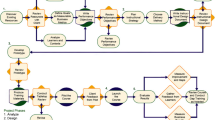Abstract
Programming is a rewarding and yet demanding field in the ICT labormarket, but it is considered a challenging and difficult area of learning for significant numbers of novice programmers. As a result, high attrition rates from introductory programming (IP) courses are reported despite extensive research which attempts to address the issue. In this research, an action research methodology was used with three cycles to investigate and improve the teaching and learning process of the IP course. There were nine activities performed during the span of these three cycles. All three entities of the didactic triangle (student, instructor, and content) together with learning context were incorporated into the research design to understand the problem better and execute the proposed solution. The result shows that three cycles of the action research methodology helps in understanding and improving the students learning outcomes in the IP course. Moreover, the attrition rate was also reduced in the IP course.






Similar content being viewed by others
References
ACM-IEEE Joint Task Force on Computing Curricula (2013). Computer science curricula 2013, ACM Press and IEEE Computer Society Press. https://doi.org/10.1145/2534860
Akdere M (2003) The action research paradigm: an alternative approach in negotiation. Syst Pract Action Res 16(5):339–354. https://doi.org/10.1023/A:1027354823205
Carr W, Kemmis S (1986) Becoming critical education, knowledge and action research, 1st edn. Routledge, Abingdon
Collatto, D.C., Dresch, A., Lacerda, D.P., Bentz, I.G. (2017). Is action design research indeed necessary? Analysis and synergies between action research and design science research, Syst Pract Action Res, https://doi.org/10.1007/s11213-017-9424-9
De Raadt, M., Toleman, M., & Watson, R. (2005). Textbooks under inspection, University of Southern Queensland, Australia, Retrieved May 2013, http://eprints.usq.edu.au/167/1/TechReport_Draft_10.pdf
Ferrance, E. (2000). Themes in Education: Action research, Brown University, retrieved 20 July, 2014 http://www.alliance.brown.edu/pubs/themes ed/act research.pdf
Gill J, Johnson P (2002) Action research for managers, 3rd edn. Sage Publication Ltd, Thousand Oaks
Iqbal S, Harsh Ok (2013) A self review and external review model for teaching and assessing novice programmers. International Journal of Information and Education Technology 3(2):120–123
Jenkins, T. (2002). Teaching programming – a journey from teacher to motivator‘, In Proceedings of 2nd annual LTSN-ICS conference, London, 65–71
Lahtinen E, Ala-Mutka K, Järvinen HM (2005) A study of the difficulties of novice programmers. ACM SIGCSE Bulletin 37(3):14–18
Lyndall, B. (2013). Action research and unit improvement in higher education: a case study approach‘, In Proceedings of the 19th APRRES Conference, RMIT University, Melbourne
Malik, S. I. (2016). Enhancing practice and achievement in introductory programming using an ADRI editor, proceedings of the IEEE International Conference on Teaching, Assessment and Learning for Engineering, IEEE, Thailand, 7-9 December, pp. 32-39, https://doi.org/10.1109/TALE.2016.7851766
Malik SI, Mathew R, Hammood M (2017) PROBSOL, a web-based application to develop problem solving skills in introductory programming. In: proceedings of the 1st AUE international research conference, Dubai
McIntosh P (2010) Action research and reflective practice: creative and visual methods to facilitate reflection and learning, 1st edn. Routledge, Abingdon
McNiff J, Whitehead J (2010) You and your action research project, 3rd edn. Routledge, Abingdon
Mills GE (2010) Action research: a guide for the teacher researcher, 4th edn. Pearson Education, London
Morton-Cooper A (2000) Action research in health care, 1st edn. Blackwell Science Ltd, Great Britain
Muir, P. (2007). Action research in the scholarship of learning and teaching. RMIT's magazine for the teaching community, Vol. 2, Issue 3, retrieved on 21 July, 2014, http://emedia.rmit.edu.au/edjournal/Action+research+in+the+scholarship
Newman JM (2000) Action research: a brief overview. Forum qualitative Sozialforschung / Forum: Qualitative Social Research 1(1)
O'Brien R (2001) An overview of the methodological approach of action research. In Roberto Richardson (Ed.), theory and practice of action research, retrieved on 20 July, 2014 http://www.web.ca/~robrien/papers/arfinal.html
Philips DK, Carr K (2010) Becoming a teacher through action research: process, context, and self-study, 2nd edn. Routledge, New York
Schmidt, K. (2002). Classroom action research: a case study assessing Students' perceptions and learning outcomes of classroom teaching versus on-line teaching‘, Journal of Industrial Teacher Education, 40, 1, USA
Scott, R.G. (2015). Improving student success in developmental math courses at a two-year college: An action research study‘, PhD Thesis, Capella University, USA https://search.proquest.com/openview/f77cc2704675299fecfd44b17f6c83ec/1?pqpqorigsite=gscholar&cbl=18750&diss=y. Accessed Oct 2015
Shuhidan, S.M. (2012). Probing the minds of novice programmers through guided learning, PhD thesis, RMIT University, Australia
Soloway E (1986) Learning to program = learning to construct mechanisms and explanations. Commun ACM 29(9):850–858
Thota, N., Berglund, A., & Clear T. (2012). Illustration of paradigm pluralism in computing education research‘, In proceedings of Australasian Computing Education Conference (ACE 2012), Melbourne
Tony C (2004) Critical enquiry in computer science education. In: Fincher S, Petre M (eds) Computer science education research: the field and the Endeavour (ISBN 90 265 1969 9, pp. 101–125). Routledge Falmer, Taylor & Francis Group, London
Webster M (1994) Overview of programming and problem solving. Merriam-Webster’s Collegiate Dictionary, 10th edn, computerscience.jbpub.com/vbnet/pdfs/mcmillan01.pdf. Accessed 15 July 2013
Winslow LE (1996) Programming pedagogy—a psychological overview. ACM SIGCSE Bulletin 28(3):17–22
Yadin A (2011) Reducing the dropout rates in an introductory programming course. ACM Inroads 2(4):71–76
Author information
Authors and Affiliations
Corresponding author
Rights and permissions
About this article
Cite this article
Malik, S.I. Improvements in Introductory Programming Course: Action Research Insights and Outcomes. Syst Pract Action Res 31, 637–656 (2018). https://doi.org/10.1007/s11213-018-9446-y
Published:
Issue Date:
DOI: https://doi.org/10.1007/s11213-018-9446-y



